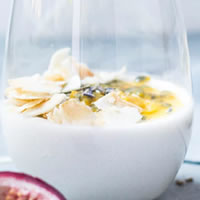Kefir
Kefir is a type of fermented milk, it is a good source of protein and calcium with the added benefits of probiotics. Probiotics are known as 'friendly bacteria' that can ease IBS symptoms such as bloating and digestive distress in some people. Kefir grains contain around 30 strains of beneficial bacteria. It is similar to yogurt, but a drink, with a tart, sour taste and a slight ‘fizz’. This is due to carbon dioxide – the end product of the fermentation process. The length of the fermentation time will affect the taste.

Traditional milk kefir uses "kefir grains and whole cow’s milk (although now you can find it made from goats milk and coconut milk). Kefir grains are small gelatinous beads that contain a variety of bacteria and yeasts. The grains are placed in a glass jar/bowl, soaked in milk, covered and left at room temperature for a minimum of 24 hours. This enables the bacteria and yeast to ferment the lactose (that natural sugar in milk) into lactic acid, activating the bacteria to grow.
Quality organic kefir contains high levels of vitamin B12, calcium, magnesium, vitamin K2, biotin, folate, enzymes and probiotics.
Lactobacillus kefiri, which is unique to kefir, has been shown in a study to inhibit the growth of some harmful bacteria such as salmonella and e-coli. Plus it's good for gut inflammatory disorders.
Kefir also provides a healthy amount of zinc. Both vitamin K2 and zinc can be beneficial for increasing levels of testosterone. Probiotics seem to decrease cortisol levels extremely well. A scientific study found out that rats fed with bacterium called Lactobacillus reuteri experienced significantly larger testicles than the group of rats who didn’t receive the bacteria. Don't leave yogurts outside for the rats to eat!
Although kefir and kombucha both contain healthful microbes, kefir is a richer source of lactic acid bacteria (LAB). So you could think of kefir as a drinkable probiotic supplement, and kombucha as more of a digestive aid.
REMEMBER: ANYTHING FERMENTED IS GOOD FOR YOU!
Sourse: bbc.com, mercola.com
